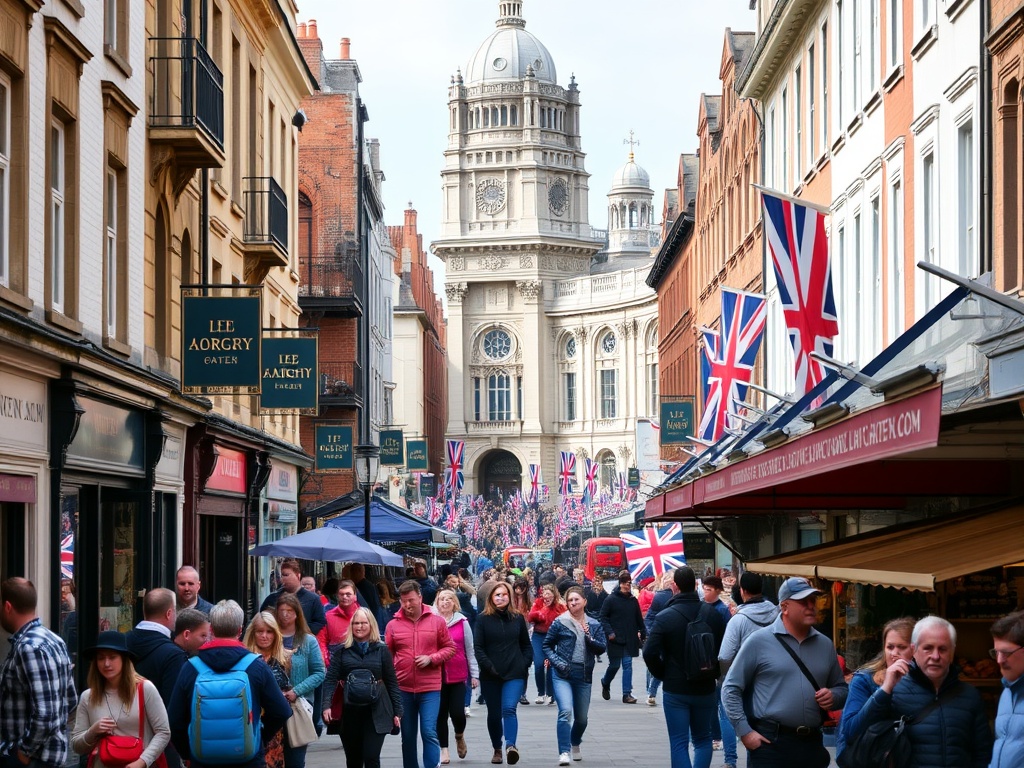Tourism Boom Amidst Challenges in the UK

Despite the overall bleak outlook of the UK economy, the tourism sector is witnessing a remarkable upswing. However, this resurgence is not without its complications. Many residents in scenic locales and bustling cities are expressing their discontent over the phenomenon known as “overtourism.” Complaints about excessive noise, littering, and the proliferation of short-term rentals, such as those offered by Airbnb, are becoming increasingly common, as these rentals are perceived to be driving up housing costs and displacing local residents.
In response to these challenges, several local councils are implementing “tourist taxes” on overnight stays. The intention behind these levies is to generate additional revenue that can be reinvested in local infrastructure and services. For instance, Edinburgh Council recently announced a 5% visitor levy on overnight accommodations, the largest of its kind in the UK, aiming to raise approximately £50 million annually. This funding will be directed towards enhancing street lighting, pedestrian-friendly initiatives, and other essential improvements.
However, tourism leaders have voiced concerns to The i Paper, suggesting that financially strained councils may utilize these funds to address existing budget deficits rather than enhancing the local environment and facilities. The tourism landscape in the UK is evolving, with 2024 seeing a record influx of 41.2 million overseas visitors, marking a 9% increase from the previous year, with expectations of an additional 5% growth in 2025.
The recent legislative measures by the SNP-led Scottish Government allow local councils to impose visitor levies, encouraging two-thirds of Scottish local authorities to consider similar measures. Cities such as Glasgow, Aberdeen, Stirling, Falkirk, Highland, and Argyll and Bute are currently engaging with their communities about potential tourist taxes.
Edinburgh’s 5% levy is set to be implemented in 2026, while the Welsh Government is also moving in this direction. A new bill permits councils to charge £1.25 per night for hotel and self-catering accommodations, and 75p for hostels and campsites. Meanwhile, in England, Manchester has initiated a voluntary £1 per night charge for hotel visitors, fostering improvements through the Accommodation Business Improvement District (ABID).
- Liverpool is planning to introduce a similar scheme, expecting a £2 nightly fee.
- London’s Mayor, Sadiq Khan, has expressed interest in exploring a comparable tourist tax.
- In Bristol, the Liberal Democrat group has proposed a £2 per night visitor levy.
Despite the potential benefits, many in the tourism sector, including organizations like the Scottish Tourism Alliance and the Welsh Tourism Alliance, are firmly opposed to the introduction of such levies. Operators of B&Bs and self-catering establishments worry that the additional tax burden will necessitate price increases, potentially driving away tourists.
Ralph Averbuch, who manages self-catering flats in Edinburgh, emphasized that the forthcoming 5% levy, to be enforced in July 2026, will create significant challenges. He stated, “Some will attempt to absorb the cost, but I’m certain it will lead to higher prices. Our economy is heavily reliant on tourism in Scotland. Why are we attempting to deter visitors?”
Russell Fraser, managing director of Loch Ness Hub and Travel, echoed these sentiments, predicting that the proposed 5% levy by Highland Council could jeopardize some accommodation providers’ viability. He expressed concern that visitors might choose alternative destinations instead.
Fraser advocates for a flat-rate charge, similar to Manchester’s £1 scheme, arguing that the percentage model under consideration in Scotland complicates administration and increases business costs.
Rowland Rees-Evans, chair of the Wales Tourism Alliance, criticized the £1.25 nightly charge, labeling it a “significant concern” for small accommodation providers. He explained, “While it may seem minimal, when VAT is included, it pushes the cost to £1.50 per night. For a group of six staying for seven nights, that totals £63. Tourists may opt for cheaper alternatives elsewhere.”
Advocates for tourist taxes argue that local councils should have the right to capture revenue from the booming tourism industry and allocate it as they see fit. The Centre for Cities think-tank is urging the UK Government to facilitate legislation enabling English councils to impose their own local levies. Paul Sweeney, the policy director, remarked, “Cities have experienced tourism growth without being able to reap the benefits. We believe it’s prudent for councils to determine how to utilize this revenue.”
Living Rent, a tenants’ union in Scotland, is calling for the tourist tax revenue to be earmarked specifically for affordable housing initiatives. Chair Aditi Jehangir stressed that the funds must prioritize “improving the lives of residents and workers in our cities,” advocating for the use of these funds for council and social housing projects.
In a commitment to community welfare, Edinburgh Council has pledged that £5 million of the anticipated £50 million raised annually will be allocated to housing and measures to mitigate tourism impacts. The Scottish Government, however, has left the specifics of how tourist taxes should be utilized open-ended, stating that levies could be adopted to significantly enhance local facilities and services.
A spokesperson for the Welsh Government reiterated that visitor levies would contribute to the “long-term sustainability” of the tourism industry, allowing for the reinvestment of funds back into local communities.




